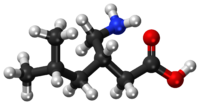
Photo from wikipedia
Aims/hypothesisPrevious studies have demonstrated a relationship between cognitive impairment and hypoglycaemia ( Click to show full abstract
Aims/hypothesisPrevious studies have demonstrated a relationship between cognitive impairment and hypoglycaemia (<3 mmol/l). This study hypothesised that non-severe insulin-induced hypoglycaemia reduces cognitive function in individuals with type 2 diabetes.MethodsIn this randomised crossover study, 25 participants with type 2 diabetes attended two experimental visits with hyperinsulinaemic glucose clamping: one hypoglycaemic clamp (plasma glucose 3.0 ± 0.2 mmol/l) and one euglycaemic clamp (plasma glucose 6.0 ± 0.2 mmol/l). Participants were eligible if their diabetes was treated with diet or glucose-lowering medications (except sulfonylureas or insulin), age was 35–70 years, BMI was 23–35 kg/m2 and HbA1c was below 75 mmol/mol (9%). Cognitive function was assessed with a neurocognitive test battery measuring verbal memory, executive function, sustained attention and psychomotor speed. From the examined cognitive domains, a global cognition score was constructed estimating global cognition. A measurement for psychomotor speed was selected as the primary outcome. Participants and people assessing the outcomes were blinded to group assignment.ResultsCognitive performance was impaired during hypoglycaemia with a mean score in the primary outcome test, Symbol Digit Modalities Test measuring psychomotor speed, of 48.7 ± 9.8 (hypoglycaemia) vs 56.6 ± 12.0 (euglycaemia); i.e. a change of −7.9 points (95% CI −10.9, −4.9; p < 0.0001). In addition, hypoglycaemia reduced global cognitive score by −0.7 (95% CI −0.9, −0.6; p < 0.0001). A stable glucose plateau was achieved during both experimental visits. For the hypoglycaemic clamp, mean plasma glucose concentration (± SD) during neurocognitive testing was 3.1 (± 0.3) mmol/l. Age, sex, fasting C-peptide, counter-regulatory hormones and the severity of hypoglycaemic symptoms did not influence cognitive function.Conclusions/interpretationAcute non-severe hypoglycaemia (mean plasma glucose 3.1 mmol/l) has a substantial negative impact on cognitive function in individuals with type 2 diabetes.Trial registrationClinicalTrials.gov NCT03014011.FundingThe study was supported in part by a research grant from the Investigator Initiated Studies Program of Merck Sharp & Dohme Corp (MSD-MA-NORD-007-01). The opinions expressed in this paper are those of the authors and do not necessarily represent those of Merck Sharp & Dohme Corp. Funding was also received from Skibsreder Per Henriksen, R. og hustrus Foundation, The Danish Alzheimer Foundation and Savværksejer Jeppe Juhl og hustrus Foundation.
Journal Title: Diabetologia
Year Published: 2019
Link to full text (if available)
Share on Social Media: Sign Up to like & get
recommendations!